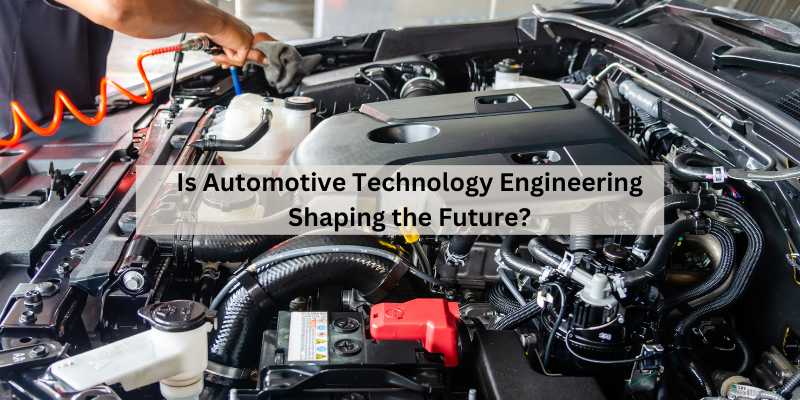Is Automotive Technology Engineering Shaping the Future?
Automotive Technology Engineering and Automotive Engineering are closely related fields that focus on different aspects of the automotive industry. The former specializes in the application of technology within the automotive sector, while the latter is centered on the design, construction, and manufacturing of automotive assemblies and components.
The automotive industry is constantly evolving, and as a result, the demand for professionals with expertise in automotive technology engineering and automotive engineering is on the rise. Individuals pursuing careers in these fields are poised to contribute to the development of innovative technologies and advancements within the automotive sector.
From enhancing vehicle performance to improving safety features and sustainability, automotive technology engineering and automotive engineering play crucial roles in shaping the future of transportation. With a strong foundation in engineering principles and a focus on automotive applications, these fields offer exciting opportunities for those passionate about driving progress in the automotive industry.
Introduction To Automotive Technology Engineering
Automotive Technology Engineering focuses on the design and manufacturing of automotive components and systems. It is a specialized field within mechanical engineering that caters to the evolving automotive industry, offering opportunities for innovation and advancement in vehicle technology. Join the journey from Automotive Technology to Automotive Engineering for a rewarding career path in this dynamic field.
The Rise Of Automotive Technology
Automotive technology engineering has witnessed a significant rise in recent years. With advancements in technology, the automotive industry has undergone a transformation, paving the way for innovative and efficient vehicles. As the demand for sustainable transportation solutions increases, automotive technology engineering plays a crucial role in developing electric vehicles, autonomous driving systems, and other cutting-edge technologies.
Comparing Automotive Technology And Engineering
While automotive technology and engineering are closely related, they have distinct roles and responsibilities. Automotive technology focuses on the practical application of engineering principles in the automotive industry. It involves the repair, maintenance, and servicing of vehicles, as well as the integration of advanced technologies into existing vehicles. On the other hand, automotive engineering encompasses the design, development, and manufacturing of vehicles, including their components and systems.
In a nutshell, automotive technology engineering deals with the implementation and utilization of engineering knowledge to improve the functionality and performance of vehicles, while automotive engineering focuses on the conceptualization and creation of new vehicles and their subsystems.
Here’s a comparison table highlighting the main differences between automotive technology and engineering:
| Automotive Technology | Automotive Engineering |
|---|---|
| Practical application of engineering principles | Design, development, and manufacturing of vehicles |
| Repair, maintenance, and servicing of vehicles | Integration of advanced technologies into vehicles |
| Focuses on existing vehicles | Creation of new vehicles and subsystems |
While both fields contribute to the advancement of the automotive industry, their areas of expertise and objectives differ. Automotive technology ensures the smooth operation and functionality of vehicles, while automotive engineering drives innovation and brings new vehicles to life.
In conclusion, automotive technology engineering and automotive engineering are essential disciplines that work hand in hand to shape the future of transportation. By combining practical skills and engineering knowledge, professionals in these fields contribute to the development of safer, more efficient, and sustainable vehicles for the modern world.
Evolution Of The Automobile Industry
Automotive technology and engineering are closely related but not the same. Automotive technology focuses on specialization within the evolving industry, while automotive engineering trains specialists in the design, construction, and manufacture of automotive components. Mechanical engineering covers a broader range of mechanical systems and devices, including automobiles.
Historical Milestones
The evolution of the automobile industry has been marked by several historical milestones that have shaped the way we travel and transport goods. From the invention of the first automobile to the development of electric and self-driving vehicles, these milestones have propelled the industry forward. Let’s take a closer look at some of these key moments:
– In 1886, Karl Benz patented the first gasoline-powered automobile, known as the Benz Patent-Motorwagen. This invention laid the foundation for the modern automobile industry and marked the beginning of a transportation revolution.
– The Ford Model T, introduced in 1908, revolutionized mass production with the implementation of assembly line manufacturing. This made automobiles more affordable and accessible to the general public, leading to a significant increase in car ownership.
– The introduction of the electric starter in 1912 by Charles Kettering eliminated the need for hand-cranking, making cars easier and safer to operate. This innovation played a crucial role in the widespread adoption of automobiles.
– The invention of the first automatic transmission by General Motors in 1939 revolutionized the driving experience. It allowed for smoother gear shifts and made driving more comfortable and accessible to a wider range of people.
Modern Technological Advancements
In recent years, the automotive industry has witnessed remarkable technological advancements that have transformed the way we drive and interact with vehicles. These advancements have not only improved vehicle performance and safety but have also paved the way for the development of autonomous and electric vehicles. Let’s explore some of these modern technological advancements:
– Electric vehicles (EVs) have gained significant popularity in recent years, thanks to advancements in battery technology. EVs offer a cleaner and more sustainable alternative to traditional gasoline-powered vehicles, reducing greenhouse gas emissions and dependence on fossil fuels.
– Autonomous vehicles, also known as self-driving cars, are another major advancement in automotive technology. Through the use of sensors, artificial intelligence, and advanced algorithms, these vehicles can navigate and operate without human intervention. Autonomous vehicles have the potential to revolutionize transportation systems, improving safety, efficiency, and convenience.
– Connected cars, equipped with internet connectivity and advanced communication systems, enable seamless integration with other devices and networks. This connectivity allows for real-time monitoring, diagnostics, and updates, enhancing vehicle performance, safety, and user experience.
– Advanced driver assistance systems (ADAS) have become increasingly common in modern vehicles. These systems utilize sensors and cameras to provide features such as adaptive cruise control, lane-keeping assist, and collision warning. ADAS technologies enhance driver safety and help prevent accidents.
In conclusion, the evolution of the automobile industry has been marked by significant historical milestones and modern technological advancements. From the invention of the first automobile to the development of electric and autonomous vehicles, the industry continues to innovate and shape the way we travel. As technology continues to advance, the future of the automotive industry holds exciting possibilities, including increased sustainability, safety, and connectivity.
Core Disciplines In Automotive Engineering
Vehicle Design And Aesthetics
Vehicle design and aesthetics are crucial aspects of automotive engineering. Engineers focus on creating visually appealing and aerodynamically efficient vehicle designs. They consider factors such as shape, color, and overall styling to enhance the vehicle’s appeal and performance.
Powertrain And Performance Engineering
Powertrain and performance engineering involves optimizing the vehicle’s powertrain system for maximum efficiency and performance. Engineers work on enhancing engine performance, transmission systems, and overall power delivery to ensure optimal driving dynamics and fuel efficiency.
Impact On Environmental Sustainability
Automotive technology engineering has a significant impact on environmental sustainability through the development of fuel-efficient vehicles and alternative power sources, reducing emissions and promoting eco-friendly practices in the automotive industry. This engineering field plays a crucial role in creating sustainable transportation solutions for a greener future.
Eco-friendly Innovations
The automotive industry has made significant strides in developing eco-friendly innovations that aim to reduce the impact of vehicles on the environment. One such innovation is the development of hybrid and electric cars that produce little to no emissions. These vehicles use electricity as their primary source of power, which reduces the need for gasoline and diesel fuel. Additionally, advancements in materials science have led to the development of lightweight materials that can reduce the weight of vehicles, which in turn reduces fuel consumption and emissions.
Challenges In Reducing Emissions
Despite these eco-friendly innovations, the automotive industry still faces challenges in reducing emissions. One of the major challenges is the high demand for vehicles that use traditional gasoline and diesel engines. These vehicles produce harmful emissions that contribute to air pollution and global warming. To combat this, the industry must continue to develop and promote eco-friendly alternatives while also encouraging consumers to make sustainable choices.
To address these challenges, governments around the world are implementing regulations and incentives to encourage the use of eco-friendly vehicles. For example, some countries offer tax credits and rebates to consumers who purchase hybrid or electric vehicles. Additionally, some cities have implemented congestion charges for vehicles that produce high levels of emissions.
In conclusion, the automotive industry has made significant progress in developing eco-friendly innovations to reduce the impact of vehicles on the environment. However, challenges remain in reducing emissions and promoting sustainable choices among consumers. By continuing to develop and promote eco-friendly alternatives and implementing regulations and incentives, we can work towards a more sustainable future.
Safety Enhancements Through Technology
Safety Enhancements Through Technology in automotive engineering have revolutionized the driving experience. From Advanced Driver-Assistance Systems to the advent of Autonomous Vehicles, technology plays a pivotal role in ensuring road safety.
Advanced Driver-assistance Systems
Advanced Driver-Assistance Systems (ADAS) are cutting-edge technologies designed to assist drivers in the driving process. These systems utilize sensors and cameras to monitor the vehicle’s surroundings and provide real-time feedback to the driver, enhancing safety on the road.
The Role Of Autonomous Vehicles
Autonomous Vehicles represent the future of automotive technology, aiming to reduce human error and enhance road safety. These vehicles are equipped with AI-powered systems that can navigate roads, interpret traffic signals, and react to potential hazards autonomously.
The Role Of Artificial Intelligence
The Role of Artificial Intelligence in Automotive Technology Engineering
Ai In Vehicle Manufacturing
Artificial Intelligence (AI) plays a pivotal role in revolutionizing vehicle manufacturing processes. It enables automated quality control, enhances production line efficiency, and ensures precise assembly of complex components.
Machine Learning For Predictive Maintenance
Machine Learning, a subset of AI, is leveraged for predictive maintenance in automotive engineering. Through advanced algorithms, it enables the proactive identification of potential equipment failures, thereby reducing downtime and optimizing operational performance.
Future Trends In Automotive Engineering
Automotive technology engineering and automotive engineering are closely related fields, but they have distinct focuses. Automotive technology engineering specializes in the rapidly changing automotive industry, while automotive engineering focuses on designing and manufacturing automotive assemblies and components. Both fields offer exciting opportunities for professionals interested in the world of automobiles.
Electric Vehicles And Battery Technology
Electric vehicles are revolutionizing the automotive industry. They are powered by advanced battery technology.
Connectivity And The Internet Of Things
Automotive engineering is integrating connectivity and the Internet of Things into vehicles for enhanced functionality.
Preparing For A Career In Automotive Technology Engineering
Preparing for a career in automotive technology engineering involves specializing in a rapidly evolving industry. Automotive engineering focuses on the design, construction, and manufacturing of automotive assemblies and components. It is a branch of mechanical engineering that deals specifically with automobiles.
Educational Pathways
To pursue a career in Automotive Technology Engineering, consider obtaining a degree in automotive engineering or a related field.
Emerging Skill Sets For Engineers
As an Automotive Technology Engineer, it is crucial to stay updated on emerging technologies and trends in the automotive industry.
Conclusion: The Road Ahead
The field of automotive technology and engineering are closely related but have distinct differences. Automotive technology focuses on specialization in the automotive industry, while engineering involves designing, constructing, and manufacturing various automotive components. As the industry continues to evolve, there will be a growing demand for professionals in both fields to innovate and develop new technologies.
Summarizing The Impact Of Automotive Engineering
Automotive engineering has revolutionized the transportation industry, leading to the development of safer, more efficient vehicles. Through advancements in design, materials, and technology, automotive engineers have enhanced vehicle performance, reduced emissions, and improved overall sustainability.
- Enhanced vehicle performance
- Reduced emissions
- Improved overall sustainability
Anticipating Future Innovations
The future of automotive engineering holds exciting prospects, with a focus on autonomous driving technology, electric vehicles, and sustainable fuel alternatives. Engineers are poised to create vehicles that are not only environmentally friendly but also equipped with advanced safety features and connectivity options.
- Autonomous driving technology
- Electric vehicles
- Sustainable fuel alternatives
Frequently Asked Questions
Are Automotive Technology And Automotive Engineering The Same?
Automotive technology and automotive engineering are not the same. Automotive technology focuses on industry specialization, while automotive engineering specializes in design, construction, and manufacturing of automotive components.
What Type Of Engineering Is Automotive?
Automotive engineering falls under the category of mechanical engineering, specializing in the design and production of automobiles. It encompasses the manufacturing, design, and mechanical operations of vehicles, including motorcycles, cars, buses, and trucks.
Is Engineering The Same As Automotive?
Automotive engineering focuses on designing and manufacturing vehicles, while engineering covers a broader range of mechanical systems. Automotive technology specializes in the evolving automotive industry.
Does Automotive Fall Under Mechanical Engineering?
Yes, automotive falls under mechanical engineering, specializing in designing and manufacturing automotive components and assemblies.
Conclusion
In the dynamic automotive industry, Automotive Technology and Engineering offer diverse career paths. While Automotive Technology focuses on specialization within the industry, Automotive Engineering delves into design and manufacturing of automotive components. Both fields contribute significantly to the advancement of vehicle technologies and innovations.
Explore the exciting journey from Automotive Technology to Automotive Engineering for a rewarding career in this ever-evolving sector.







